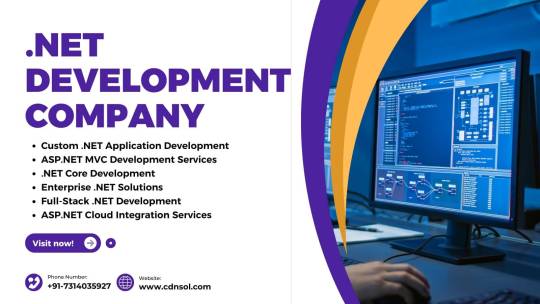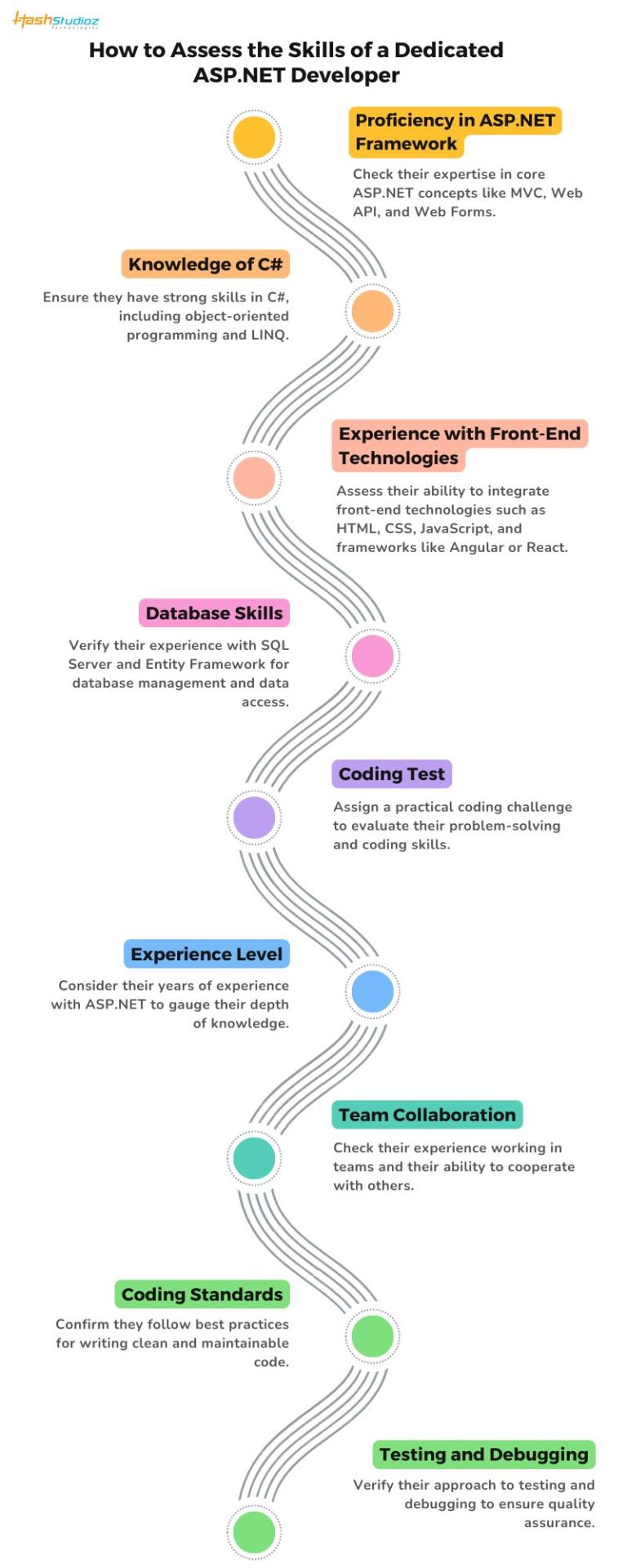#ASP.NET with MVC
Explore tagged Tumblr posts
Link
#ASP.NET#ASP.NETCore#ASP.NETCorerouting#HTTPRedirect#HttpRequest#HTTPResponse#MVC#RazorPages#Requestpipeline#Views#WorkInProgress
2 notes
·
View notes
Video
youtube
3 notes
·
View notes
Text
Top .NET Development Company | Custom .NET Solutions for Enterprises
Looking for a .NET development company? We provide full-stack .NET app development services using Microsoft’s .NET technology. From custom .NET solutions to enterprise-level ASP.NET applications, we deliver scalable and innovative software to meet your business needs. Visit now to know more.

#.net development company#.net development services#.net application development company#best .net application development company#customized .net solutions#microsoft's .net technology#.net development#.net technology#asp.net development services#.net app development services#.net framework services#custom .net application development#enterprise .net solutions#asp.net mvc development services#full-stack .net development#asp.net cloud integration services#asp.net applications#.net solutions#.net core development
0 notes
Text
Understanding MVC Architecture in ASP.NET
MVC (Model-View-Controller) is a software architectural pattern that divides an application into three main components: Model, View, and Controller. ASP.NET, developed by Microsoft, leverages this architecture to create scalable, maintainable, and testable web applications. In this article, we’ll explore the MVC architecture in ASP.NET, how it works, and why it's a preferred pattern for developers.
What is MVC Architecture?
The MVC architecture separates an application into three interconnected components:
Model: Represents the application’s data and business logic. It directly manages the data and rules of the application, usually interacting with the database in ASP.NET MVC applications.
View: Responsible for displaying the data from the Model to the user. In ASP.NET, Views are typically Razor Pages or HTML markup that dynamically render content based on the data from the Model.
Controller: Acts as a bridge between the Model and View. It handles user requests, processes them (interacting with the Model as necessary), and decides which View to render. In ASP.NET MVC, Controllers are C# classes that manage the flow of data and handle business logic.
How MVC Works in ASP.NET
The request/response cycle in an ASP.NET MVC application follows this pattern:
Routing: The ASP.NET routing engine processes the user’s request and maps it to the correct Controller and action method.
Controller: Receives the request, processes it, and may interact with the Model to retrieve or update data.
Model: Contains the logic for data fetching, updating, or processing.
View: After processing the data, the Controller selects a View, which renders the data and generates an output (typically an HTML page).
Response: The generated View is returned to the user as an HTTP response.
This clear separation ensures that each component focuses on its own responsibilities, resulting in clean and maintainable code.
Key Components of ASP.NET MVC
Models in ASP.NET MVC
Models are responsible for representing the data and business logic of the application. They typically interact with the database, apply validation, and execute business rules. ASP.NET MVC models can use plain C# classes or the Entity Framework for database operations.
Example of a simple Model:
Views in ASP.NET MVC
Views present the data to the user and are generally Razor pages (.cshtml files) that combine HTML and C# code. Razor syntax allows developers to generate dynamic content while maintaining clean code.
Controllers in ASP.NET MVC
Controllers handle user input, processing the data, and determining which View to display. Each action method in a Controller corresponds to a specific endpoint.
Advantages of MVC Architecture in ASP.NET
Separation of Concerns: The business logic (Model), user interface (View), and input logic (Controller) are separated, making the application easier to manage, develop, and test.
Testability: Each component can be independently tested, improving the reliability of the application.
Scalability and Maintainability: As the application grows, features can be added without affecting existing functionality.
Extensibility: ASP.NET MVC is highly extensible, allowing developers to customize components like routing, filters, and dependency injection.
Better Control Over HTML and URLs: MVC gives developers full control over HTML and URLs, essential for building SEO-friendly applications.
MVC in ASP.NET vs. WebForms
Before ASP.NET MVC, developers commonly used WebForms, which followed an event-driven model. While WebForms is easier for beginners, it hides much of the complexity of HTTP, leading to less control over HTML and URLs. MVC, on the other hand, provides full access to underlying web protocols, giving developers more flexibility and control for building modern web applications.
ASP.NET MVC provides a powerful, flexible framework for building web applications with a clear separation of concerns. By leveraging the Model-View-Controller pattern, developers can build scalable, maintainable, and testable applications. Whether for simple websites or complex web applications, ASP.NET MVC offers the tools and structure for success.
For developers transitioning from older frameworks or starting fresh, MVC simplifies development while laying a solid foundation for modern and scalable applications
1 note
·
View note
Text

When hiring a dedicated ASP.NET developer, it’s essential to assess their skills effectively. Look into their experience with ASP.NET and related technologies, test their problem-solving abilities, and evaluate their understanding of best practices and design patterns. Don’t forget to check their past projects and references. Communication skills are also key. Get the right developer for your project and drive success! 🚀💻
#ASPNet#DeveloperSkills#TechTalent#Hire .NET Developers#Expert .NET developers#Hire Full Stack .NET Developers#Hire dedicated .Net developer#Hire ASP.Net Developers#Hire ASP.Net programmers#Hire.net Experts#.Net Development Company#.Net development services#Hire .net Consultant#hire dedicated .net developers#hire dedicated asp.net developer#hire dot net developer#hire asp.net mvc developers
0 notes
Link
In the ever-evolving world of web development, staying updated with the latest frameworks and technologies is crucial. ASP.NET MVC (Model-View-Controller) is one such powerful framework that has become a staple for developers building dynamic, robust, and scalable web applications. This article provides an in-depth look at an ASP.NET MVC Course designed to equip you with the skills needed to excel in web development.
0 notes
Text
1 note
·
View note
Text
Introducing Hotelizer: Revolutionizing Hotel Management with ASP.NET Core
We invite you to explore Hotelizer on my GitHub.
In the fast-paced world of hospitality, efficiency, and innovation are key to providing exceptional guest experiences. Today, we’re excited to introduce Hotelizer, a cutting-edge hotel management system designed to streamline operations and elevate guest services. Built on ASP.NET Core MVC and leveraging a SQL Server Database, Hotelizer is not just another management tool; it’s a comprehensive…
View On WordPress
0 notes
Text
The demand for ASP.NET MVC developers is on the rise, making them highly sought after in the IT industry. Employers look for specific skills and qualifications when hiring ASP.NET MVC developers:
Proficiency in ASP.NET MVC Framework: ASP.NET MVC offers ease of creating robust and feature-rich web applications, making it a crucial skill for developers. Companies prioritize candidates with expertise in ASP.NET MVC due to its widespread adoption and versatility.
SQL and database management skills: Given the importance of data in the tech industry, employers value developers who possess strong database management skills. Familiarity with SQL, Microsoft SQL Server, and MySQL, along with tools like Entity Framework, enhances a developer's profile and increases their chances of securing a job.
Client-side web development expertise: Creativity and innovation in client-side web development are essential for building appealing and interactive applications. Knowledge of HTML, CSS, jQuery, Bootstrap, and JavaScript is highly valued, as it demonstrates a developer's ability to create engaging user experiences.
Microsoft Certified Solutions Developer (MCSD) certification: Employers prioritize candidates with MCSD certification, as it validates their expertise in Microsoft technologies. MCSD-certified developers are highly regarded for their up-to-date knowledge and skills, enhancing their competitiveness in the job market.
In addition to technical skills, ASP.NET MVC developers should possess strong problem-solving abilities, effective communication skills, and excellent interview skills to secure desirable positions in reputable organizations.
0 notes
Text
#Asp.Net MVC Development Company USA#ASP.NET Service Providers India#Outsource MVC development USA#Web Development Company USA#CMS Development Company USA
0 notes
Text
Hire Dot Net Web Application Development

Looking To Hire .Net Developers? You’re At The Right Spot
With Our expertise in various programming languages, We can help you find and hire talented developers who can fulfill your project needs. Also we have customized packages based on your needs and can engage on both short & long term contracts.
Hire Dot Net Web Application Development

Why Hire .NET Programmers For Your Web Development Project?
Hiring .NET programmers for your web development project can bring numerous benefits. .NET .is a powerful and versatile framework that allows for the creation of robust and scalable web applications. Experienced .NET developers can leverage this framework to build applications that are fast, secure, and easy to maintain.
They are also skilled in using various development tools and technologies that integrate with .NET, such as Microsoft Visual Studio and SQL Server. Overall, hiring .NET programmers can ensure that your web development project is completed efficiently and to a high standard.
Our Complete Suite Of .NET Development Services
Web Application Development
This involves developing web applications using the ASP.NET framework.
MVC Development
This is a web application framework that is built on top of ASP.NET and allows developers to build web applications using the Model-View-Controller architecture.
Web API Development
This involves building RESTful APIs using the ASP.NET framework, which can be consumed by different client applications.
CMS Development
This involves developing content management systems (CMS) using the ASP.NET framework, which allows users to manage and publish content on websites.
E-Commerce Development
This involves building e-commerce websites and applications using the ASP.NET framework, which allows businesses to sell their products online.
Custom Development
This involves developing custom web applications using the ASP.NET framework, tailored to meet specific business requirements.
Migration Services
This involves migrating existing web applications to the ASP.NET framework, which can help to improve performance and scalability.
Integration Services
This involves integrating different systems and applications with ASP.NET, such as integrating with third-party APIs or integrating with other Microsoft technologies.
Maintenance And Support
This involves providing ongoing maintenance and support for web applications built using the ASP.NET framework, ensuring that they continue to function smoothly and efficiently.
READ NOW
#Looking To Hire Dot Net Developers?#Hire Dot Net Programmers ?#Why / Hire Dot Net Programmers?#Hire Dot Net Programmers Your Web Development Project ?#Hire Dot Net Web Application Development#Hire ASP.NET Developers#Hire ASP.NET Programmers#Hire the best ASP.NET developers#Hire Best Dot Net Programmers ?#Hire ASP.Net Developers & Programmers#Hire asp .net programmers in india#Dot Net Development in India#Hire Dot Net Development in IndiaHire Dot Net Developers | Web Application Development#Hire Dot Net Developers | MVC & CMS Development#Hire Dot Net Developers | | E-Commerce Development#Hire Complete Suite of .NET Development in india#Dot Net Developers | Web API Development in india#Dot Net Developers | Custom Development in india
1 note
·
View note
Text
Razor Page is similar to the HTML page but it loads data easily. A Razor Page is almost the same as ASP.NET MVC’s view component. It has basically the syntax and functionality the same as MVC. Razor pages vs. MVC in ASP.NET
#razor#razor pages#mvc#mvc development#asp.net#asp.net development#razor pages vs mvc#dotnet development#software outsourcing#software development
1 note
·
View note
Text
1 note
·
View note
